
Daniel Defoe was an English novelist, journalist, merchant, pamphleteer and spy. He is most famous for his novel Robinson Crusoe, published in 1719, which is claimed to be second only to the Bible in its number of translations. He has been seen as one of the earliest proponents of the English novel, and helped to popularise the form in Britain with others such as Aphra Behn and Samuel Richardson. Defoe wrote many political tracts, was often in trouble with the authorities, and spent a period in prison. Intellectuals and political leaders paid attention to his fresh ideas and sometimes consulted him.
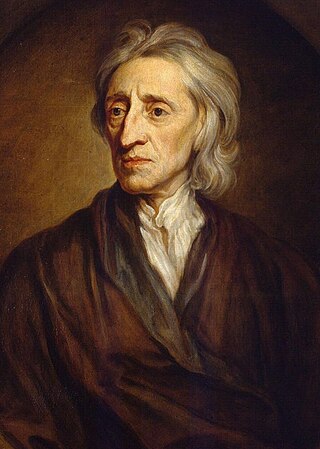
John Locke was an English philosopher and physician, widely regarded as one of the most influential of Enlightenment thinkers and commonly known as the "father of liberalism". Considered one of the first of the British empiricists, following the tradition of Francis Bacon, Locke is equally important to social contract theory. His work greatly affected the development of epistemology and political philosophy. His writings influenced Voltaire and Jean-Jacques Rousseau, and many Scottish Enlightenment thinkers, as well as the American Revolutionaries. His contributions to classical republicanism and liberal theory are reflected in the United States Declaration of Independence. Internationally, Locke's political-legal principles continue to have a profound influence on the theory and practice of limited representative government and the protection of basic rights and freedoms under the rule of law.
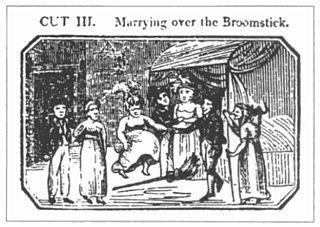
Jumping the broom is a phrase and custom relating to a wedding ceremony in which the couple jumps over a broom. It is most widespread among African Americans and Black Canadians, popularized during the 1970s by the novel and miniseries Roots, and originated in mid-19th-century antebellum slavery in the United States. The custom is also attested in Irish weddings.

Sexual abstinence or sexual restraint is the practice of refraining from sexual activity for reasons medical, psychological, legal, social, philosophical, moral, religious or other. It is a part of chastity. Celibacy is sexual abstinence generally motivated by factors such as an individual's personal or religious beliefs. Sexual abstinence before marriage is required by social norms in some societies, or by law in some countries. It is distinct from asexuality, which is a sexual orientation where people feel small or no sexual attraction.

Free love is a social movement that accepts all forms of love. The movement's initial goal was to separate the state from sexual and romantic matters such as marriage, birth control, and adultery. It stated that such issues were the concern of the people involved and no one else. The movement began during the 19th century and was advanced by hippies during the 1960s and early 70s.
Clerical celibacy is the requirement in certain religions that some or all members of the clergy be unmarried. Clerical celibacy also requires abstention from deliberately indulging in sexual thoughts and behavior outside of marriage, because these impulses are regarded as sinful. Vows of celibacy are generally required for monks and nuns in Christianity, Buddhism, Hinduism, Jainism and other religions, but often not for other clergy.
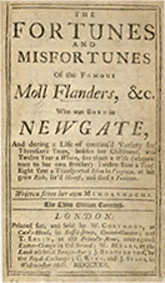
Moll Flanders is a novel by Daniel Defoe, first published in 1722. It purports to be the true account of the life of the eponymous Moll, detailing her exploits from birth until old age.

Marriage in the Catholic Church, also known as holy matrimony, is the "covenant by which a man and woman establish between themselves a partnership of the whole of life and which is ordered by its nature to the good of the spouses and the procreation and education of offspring", and which "has been raised by Christ the Lord to the dignity of a sacrament between the baptized". Catholic matrimonial law, based on Roman law regarding its focus on marriage as a free mutual agreement or contract, became the basis for the marriage law of all European countries, at least up to the Reformation.

Samael Aun Weor, born Víctor Manuel Gómez Rodríguez, was a teacher and author of over sixty books of esoteric spirituality. He formed a new religious movement under the banner of "Universal Gnosticism", or simply gnosis, and taught the practical and esoteric principles to awaken and fundamentally change the psychological condition.
Prior to the 20th century, the three major branches of Christianity—Catholicism, Eastern Orthodoxy and Protestantism —generally held a critical perspective of birth control. Among Christian denominations today, however, there is a large variety of views regarding birth control that range from the acceptance of birth control to only allowing natural family planning to teaching Quiverfull doctrine, which disallows contraception and holds that Christians should have large families.
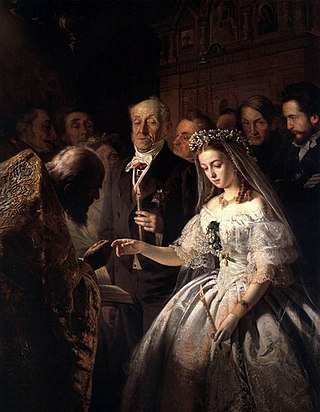
Forced marriage is a marriage in which one or more of the parties is married without their consent or against their will. A marriage can also become a forced marriage even if both parties enter with full consent if one or both are later forced to stay in the marriage against their will.
Natural family planning (NFP) comprises the family planning methods approved by the Catholic Church and some Protestant denominations for both achieving and postponing or avoiding pregnancy. In accordance with the Church's teachings regarding sexual behavior, NFP excludes the use of other methods of birth control, which it refers to as "artificial contraception".
In the jurisprudence of the canon law of the Catholic Church, a dispensation is the exemption from the immediate obligation of the law in certain cases. Its object is to modify the hardship often arising from the rigorous application of general laws to particular cases, and its essence is to preserve the law by suspending its operation in such cases.
In the Catholic Church, a declaration of nullity, commonly called an annulment and less commonly a decree of nullity, and in some cases, a Catholic divorce, is an ecclesiastical tribunal determination and judgment that a marriage was invalidly contracted or, less frequently, a judgment that ordination was invalidly conferred.

Family is a group of people related either by consanguinity or affinity. It forms the basis for social order. Ideally, families offer predictability, structure, and safety as members mature and learn to participate in the community. Historically, most human societies use family as the primary purpose of attachment, nurturance, and socialization.
Catholic theology of sexuality, like Catholic theology in general, is drawn from "natural law", canonical scripture, divine revelation, and sacred tradition, as interpreted authoritatively by the magisterium of the Catholic Church. Sexual morality evaluates sexual behavior according to standards laid out by Catholic moral theology, and often provides general principles by which Catholics can evaluate whether specific actions meet these standards.
The theology on the body is a broad term for Catholic teachings on the human body.

"Thou shalt not commit adultery" is found in the Book of Exodus of the Hebrew Bible. It is considered the sixth commandment by Roman Catholic and Lutheran authorities, but the seventh by Jewish and most Protestant authorities. What constitutes adultery is not plainly defined in this passage of the Bible, and has been the subject of debate within Judaism and Christianity. The term fornication means illicit sex, prostitution, idolatry and lawlessness.

Muslim marriage and Islamic wedding customs are traditions and practices that relate to wedding ceremonies and marriage rituals prevailing within the Muslim world. Although Islamic marriage customs and relations vary depending on country of origin and government regulations, both Muslim men and women from around the world are guided by Islamic laws and practices specified in the Quran. Islamic marital jurisprudence allows Muslim men to be married to multiple women.
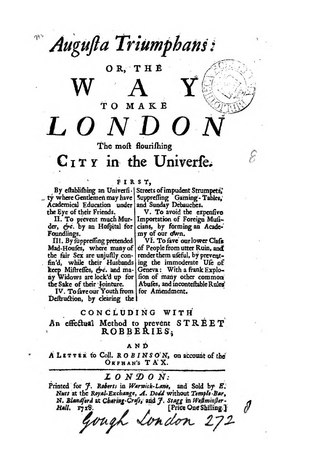
Augusta Triumphans: or, the Way to Make London the Most Flourishing City in the Universe by Daniel Defoe was first published on 16 March 1728. The fictitious speaker of this pamphlet, Andrew Moreton, is a man in his sixties who offers suggestions for the improvement of London. In particular, he fosters the establishment of a university, an academy of music, a hospital for foundlings and licensed institutions for the treatment of mental diseases. Moreover, he encourages the introduction of measures to prevent moral corruption and street robbery.














